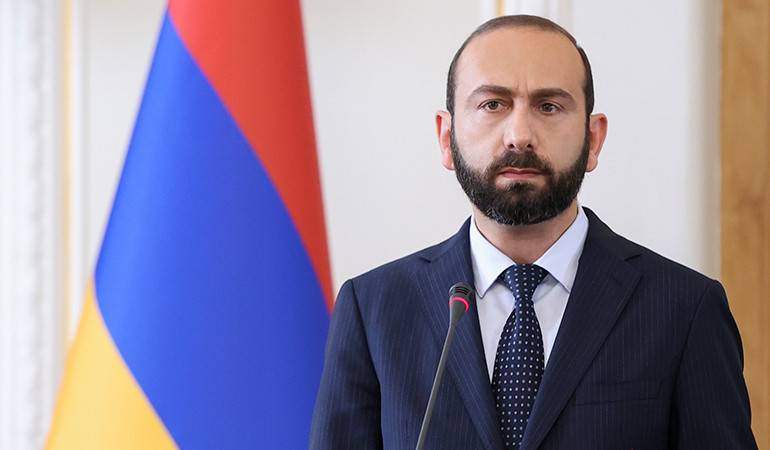Answers of the Minister of Foreign Affairs of Armenia Ararat Mirzoyan to questions of the media
27 July, 2023Question: “Yerevan has an understanding of the need to convince the Armenians of Nagorno-Karabakh to meet with the representatives of Azerbaijan”. How will you react to this statement made by the Foreign Minister of Russia? Does Yerevan continue to insist that there should be an international mechanism for the Baku-Stepanakert dialogue, or was the Foreign Minister of Russia referring to a meeting without it?
Answer: The position of the Armenian side regarding the need to address the rights and security issues of the people of Nagorno-Karabakh in the context of achieving lasting peace in the region has not changed. We have repeatedly emphasised that these issues should be addressed through the Baku-Stepanakert dialogue, and the effectiveness of that dialogue can be guaranteed only through international engagement, under an effective international mechanism.
Question: After the trilateral negotiations of the Foreign Ministers of Armenia, Russia and Azerbaijan in Moscow, from the words of the Foreign Minister of Russia Sergey Lavrov, we could conclude that during the negotiations, the topic of the rights of the Armenians of Nagorno-Karabakh was interlinked to the topic of the protection of the rights of national minorities in Armenia. How does the official Yerevan comment on this statement?
Answer: Addressing the rights and security issues of the people of Nagorno-Karabakh has always been at the core of the Nagorno-Karabakh conflict, and on July 25 in Moscow and in other capitals before that, during the negotiations with Azerbaijan, the Armenian side raised and continues to raise the issue of ensuring the rights and security guarantees of the people of Nagorno-Karabakh.
In essence, it is also enshrined in the November 9, 2020, Trilateral statement, which specifically mentions the concepts of Nagorno-Karabakh, the territory of Nagorno-Karabakh and the line of contact with Nagorno-Karabakh. The point seven of the same Trilateral statement also envisages the return of refugees to the territory of Nagorno-Karabakh and neighbouring regions, which so far has not been implemented by Azerbaijan. We are talking here about Hadrut, Shushi, Martakert, Askeran, Shahumyan and Getashen regions.
Of course, the Armenian side also considers the rights and problems raised by Armenians forcibly displaced from different settlements of Azerbaijan during 1988-1991, in particular from Baku, Kirovabad, Sumgait and other places, and before that from the Nakhichevan Autonomous Republic as well.
Nevertheless, the problem of ensuring the rights and security of the Armenians of Nagorno-Karabakh, a local indigenous people, is entirely different in its deep essence and has no parallels. It cannot in any way be connected with other topics, including one of the rights of “citizens living” (as described by the Foreign Minister of Russia) in the Republic of Armenia, provided under international commitments and fully ensured by the Republic of Armenia. Accordingly, during the last trilateral meeting in Moscow, there was no discussion, let alone agreement, outside of this logic.
Question: The Azerbaijani side, referring to the statement by President of the European Council Charles Michel following the trilateral meeting in Brussels on July 15, claims that an agreement has been reached to ensure cargo transportation to Nagorno-Karabakh through other roads. How would you comment on this?
Answer: Armenia, Russia and Azerbaijan reached an agreement on the Lachin corridor back in 2020, as envisaged by the Trilateral statement of November 9, and the signatures of the leaders of the mentioned three countries are under that agreement.
We reiterate our principled position that the illegal blockade of the Lachin corridor should be eliminated, and the regime enshrined in the Trilateral statement of November 9 should be restored. The Republic of Armenia has no authority and cannot discuss issues related to other roads for cargo transportation to Nagorno-Karabakh.
It is noteworthy that the international partners also stressed in their public statements that the lifting of the blockade of the Lachin corridor has no alternative and that various references on other roads cannot be considered as an alternative to lifting the blockade of the Lachin corridor, which is the direct obligation of Azerbaijan.
In this regard, it is worth recalling once again the legally binding Orders of the UN Court of Justice of February 22 and July 6, 2023, which unequivocally confirm our stated position.


